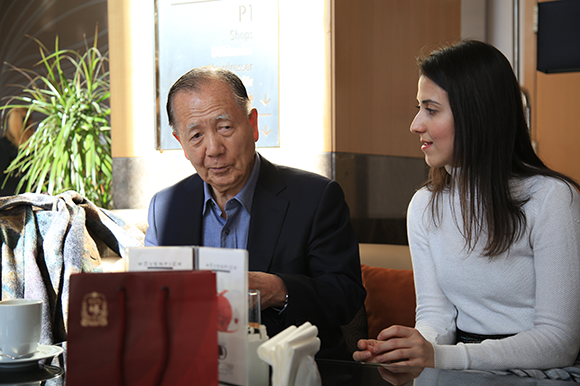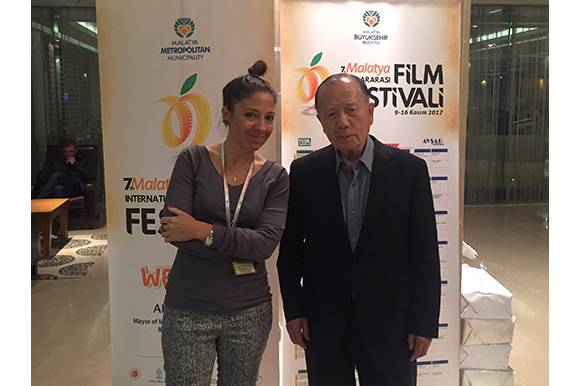He answered our questions from the bottom of his heart.
- You have worked in several positions in South Korea since 1960’s in the ministry of culture and you made a big contribution to the cultural and art activities of your country. Starting from 80’s, you worked as a manager in film industry. You founded Busan Film Festival in 1990, you are one of the founders of NETPAC. You are awarded this year in Malatya Film Festival with the life time achievement award since you have great contributions to the expanding of South Korean cinema worldwide. What are your feelings right now?
Since this year is also the 60th year of the diplomatic relations of Korea and Turkey, it’s so much meaningful for me to be honored with this award this year. Also, after founding the Busan Film Festival 22 years ago, this year I got retired. So, this award is like the reward of my efforts for 22 years as well. So meaningful. I’m so proud.
- You have a command of all the details of how a festival should be organized. You also have been to lots of big festivals worldwide. Which festivals are the best festivals of the world and what makes a festival successful?
 Choosing the good movies tactfully, choosing the right guests and hosting them professionally, composing a lively, dynamic wide audience are the key elements of a successful festival. Cannes and Berlin Film Festivals are the best festivals of the world definitely since all the countries are attending and a large variety of films are being shown.
Choosing the good movies tactfully, choosing the right guests and hosting them professionally, composing a lively, dynamic wide audience are the key elements of a successful festival. Cannes and Berlin Film Festivals are the best festivals of the world definitely since all the countries are attending and a large variety of films are being shown.
- Since you have great contributions to the presentation of your country’s films to the world, what can you say about the key elements for a country to present their films and filmmakers to be?
First of all, a country should show that it cares about its cinema, about the actors and actresses, the directors etc. After that, in order to present the productions they own to the world, they must organize festivals, they must attend festivals worldwide. Arthouse cinema, not aiming to gain money in the first place, must be presented to all the people, not only people aware of the arthouse productions. They must be screened and be accustomed to. Municipalities, governorships must support the screenings. First, good movies must be in the right place in their countries, where they are worth, then they can travel the world easily. I might add that a good film must have a good scenario first, good actors second and then good directing of course.
- As you expressed, you have founded the Busan Film Festival 22 years ago and it still contiunes with a big success. Can you tell us a little bit about the stages of the festival from the beginning till now?
Yes, it was founded in 1996. Last month, it was the 22nd of the festival. The aim from the beginning was to present the Asian new directors to the world. We had very good projects and programs during the stages of the festival. We explored new directors from Asia and we helped them open up globally by the contribution of the festival. We supported the producers and directors in every possible way, so they became successful in their projects. We created funds for the pre-production and post-production for the up and coming projects. This is what we call Asian Project Market. Since there are not enough schools about cinema in Asia, we gave free lessons for 3 weeks to the filmmakers. The films which took lessons from the festival were invited to Cannes, so lots of films from Asia came to Busan. That’s why it became the best film festival of Asia.
- One of the competing films in Malatya this year, Daha/More by Onur Saylak was shown in Busan this year. As you mentioned earlier in the opening night, Yesim Ustaoglu and Nuri Bilge Ceylan are among the Turkish directors who came to Busan Film Festival in the recent years. We know that you always supported Turkish cinema in the festival, screening lots of Turkish films. How do you find the Turkish cinema?
Personally, I find it very successful. Most of the films show the cultural and historical acpects of Turkey in a very accomplished way. The actors and actresses are mostly so talented, they are known worldwide. I like the movies of Nuri Bilge Ceylan. I also loved the movie “Kalandar Soğuğu” by Mustafa Kara, I think the director will continue shooting good films. In lots of festivals I was present at, I hear the names Yesim Ustaoglu, Nuri Bilge Ceylan etc. a lot. These directors and films are spotted by important countries festivals.
- Do you want to add anything?
I’m so happy to be in an almost 6,000 years old ancient city, Malatya. I was so impressed that it holds marks from prehistoric and middle ages. It’s a quiet city with polite people. I would love to come again. Thank you.




















